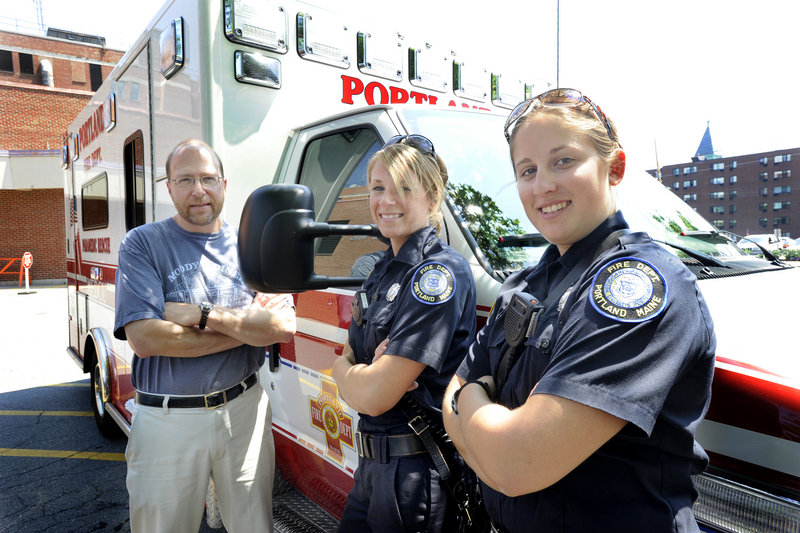PORTLAND – Meagan Letellier and Caroline Harden had just parked their ambulance at the Central Fire Station on Congress Street and were standing just a few feet away when they heard a muffled announcement over the station’s loudspeaker.
“That’s us,” said Letellier, 26, a firefighter/paramedic with the Portland Fire Department, who was holding an iced coffee she had only started to sip. “You can ride in the back.”
That was my introduction to what Harden, a firefighter/EMT, and Letellier do all day. There was no time for them to explain the job or give me a tour of the ambulance. I met them, they got a call, and off we went.
I sat in a little swivel seat behind Letellier and Harden. Harden drove, and Letellier told me to prepare for the very loud siren and horn. In fact, she put big earphones over her ears, since she hears the noise all day long and wants to save her hearing.
“By sitting up here, you can watch how people don’t pull over for us,” said Harden.
As we weaved through traffic and sped through red lights, I tried to read the computer screen up front that listed information about the call to which we were headed. It was to help an elderly woman in a Portland nursing complex who was bleeding from a cut. (Federal law prohibits the release of information that would identify anyone receiving medical treatment.)
I carried a backpack full of supplies into the woman’s apartment. The backpack included bandages, ice packs, blood pressure monitors, stethoscopes, a blood sugar monitor and ventilation equipment. It felt like it weighed 100 pounds, and this was the “light” pack, Letellier said.
They also had a suitcase filled with other more complicated equipment for serious cases. Besides being trained by the fire department, Letellier has an associate degree in paramedicine.
ENCOUNTERING TRAIL OF BLOOD
We entered the woman’s apartment and saw a trail of blood from the front door to the bathroom. She had cut her leg on the metal part of a recliner. Letellier approached her in the bathroom, bandaged the wound, put ice on it, and told her she didn’t need stitches but probably should have the wound cleaned and looked at in the hospital.
The woman was worried about the blood on her shoes, so Letellier looked under her sink for a bucket, found one, and soaked the woman’s shoes in it.
Harden got a list of medications taken by the patient so they could let the hospital know about them. After the woman was checked into the hospital, Letellier wrote out a report while I helped Harden strip the sheets off the stretcher and remake it with fresh linens. I couldn’t get the fitted sheet to fit too well, so Harden finished it.
Then I wheeled the stretcher back to the ambulance. It was heavy because of the hydraulics that power the automatic lift and wheels, and it got away from me a few times in the uneven parking lot. Harden told me when there’s a patient on the stretcher, both of them push to avoid such problems.
WORKING 24-HOUR SHIFTS
Harden and Letellier have been working together for two years, on 24-hour shifts. Usually, one of them drives for the first 12 hours, and the other one drives the second 12. They have beds at the fire station, but they never know how much sleep, if any, they’ll get. So they always make sure they have nothing scheduled a day after work, in case they need to do some heavy-duty sleeping.
“The lack of sleep and the lack of eating are the worst parts of the job for me,” said Letellier. “I’ll get some crackers or something at the hospital and snack until I get enough time to eat.”
The day I rode with Letellier and Harden, they started around 8 a.m. and had already responded to two calls when I joined them about 9:30 a.m.
They kept answering calls, with no real break, until early afternoon, when I left them.
Another call I went on was for a middle-aged woman who had fallen and gashed her leg in her kitchen. She spoke very little English, so Harden got her personal information from identification in her purse and Letellier found out what happened from her daughter.
Letellier and Harden usually cover the city’s West End, where calls range from medical complaints or alcohol and drug overdoses to falls, cuts and other injuries. Sometimes, they get calls from people who want to go to the hospital for a minor complaint but can’t afford a taxi.
“We can’t refuse anyone who has a legitimate reason to go to the hospital,” said Letellier.
Harden told me she once had a patient whose heart had stopped and they “shocked” him back to life using the equipment in their ambulance. But they also responded to a call for an infant in cardiac arrest, and could not bring the baby back to life.
“That really affected me,” said Harden. “It can’t help but affect you.”
Staff Writer Ray Routhier can be contacted at 791-6454 or at:
rrouthier@pressherald.com
Send questions/comments to the editors.




Success. Please wait for the page to reload. If the page does not reload within 5 seconds, please refresh the page.
Enter your email and password to access comments.
Hi, to comment on stories you must . This profile is in addition to your subscription and website login.
Already have a commenting profile? .
Invalid username/password.
Please check your email to confirm and complete your registration.
Only subscribers are eligible to post comments. Please subscribe or login first for digital access. Here’s why.
Use the form below to reset your password. When you've submitted your account email, we will send an email with a reset code.